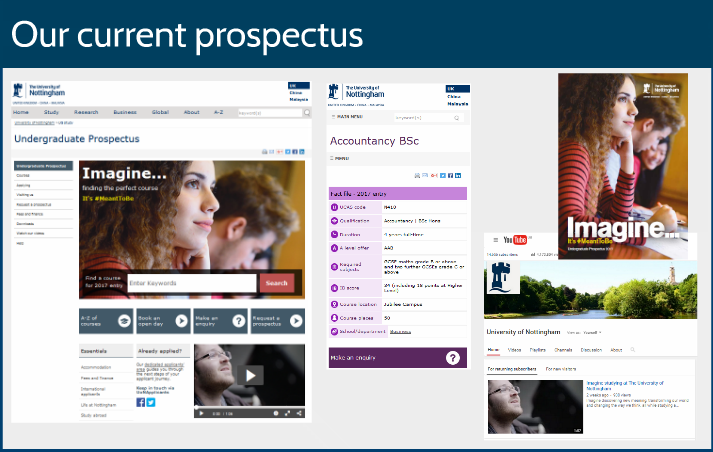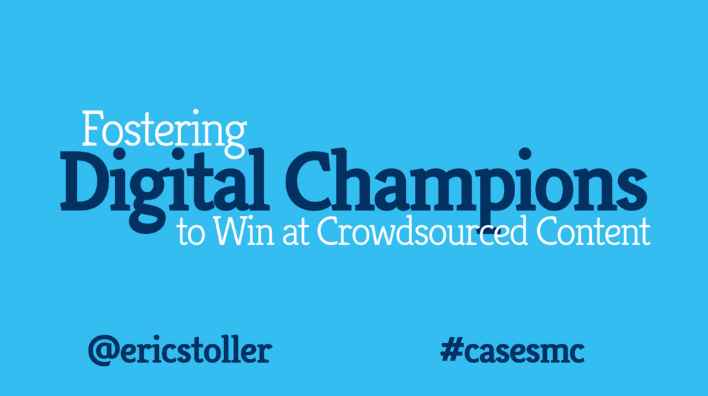CASE social media and community conference 2016
From Gutenberg to Zuckerberg, from content to content professionals
Back in March I travelled down to Brighton to attend CASE Europe’s Social Media and Community Conference 2016.
The conference had three broad themes:
- The latest trends in social media and related strategic tools both inside and outside the Higher Education (HE) sector.
- The impact of social media on institutions and communities.
- Developing social media strategies and demonstrating return on investment.
Across the two days there were many very informative sessions on a range of topics from alumni community building to video making. However, in terms of the digital communications team’s remit and work, the following three sessions were the most relevant.
Making prospectuses work for digital natives
Tom Wright, head of digital at the University of Nottingham, led this very interesting session exploring the challenges of moving to a “digital first” approach with prospectuses and considering options including user-generated content, apps and personalised prospectuses [presentation slides].
Key takeaways:
- It is essential to keep up to date with the latest trends and the most popular platforms.
- An overarching content marketing strategy is key to successfully moving to a “digital first” approach – processing marketing content through traditional skills-based silos results in siloed outputs.
- The importance of “authentic” content. Young people are very cynical about marketing and are much more trusting of peer-generated content.
- Do not be afraid to experiment with different content and new platforms.
- Consider an e-commerce approach to digital prospectus e.g. personalised content or a “build your own” format.
Fostering digital champions to win at crowdsourced content
Eric Stoller, student affairs and technology blogger at Inside Higher Ed, led this session on embracing crowdsourced, community-driven content; letting go of control; and growing your own digital champions [presentation slides].
Key takeaways:
- Identify your digital ambassadors and trust them – too many restrictions equals bad (not authentic) content.
- Don’t be a faceless brand – people want to communicate with human beings.
- Senior leaders are your biggest digital champions. Debra Humphris, VC University of Brighton and Santa J Ono, President of the University of Cincinnati are great examples of this.
Social media 101 – the new players
Alistair Beech, senior digital communications officer at the University of Central Lancashire, shared a glimpse into the mind of a HE social media manager. Using live examples, Alistair presented best practice from across the sector and beyond, attempting to scope out the most worthwhile new players [presentation slides].
Key takeaways:
- The current “big three” are Facebook, Twitter and Instagram – this is where most institutions’ efforts are focused.
- The new up-and-coming players are Snapchat, Yik Yak and WhatsApp.
- Snapchat:
- 23% of smartphone users in the UK use Snapchat
- 8 billion videos watched a day (roughly the same as Facebook)
- Live stories could be used to present user-generated views of university life.
- Yik Yak:
- 98% of users are millennials
- You can “Yak” from over 2,000 campuses, mostly in the UK and the US
- Generates communication around campus and university life and promotes a supportive university community with very strict policies on bullying.
- WhatsApp:
- 1 billion current users with 300 million new users in the past 12 months
- Distributes 64 billion messages per day
- Could be used for campus news and alerts, group learning and teaching, and student recruitment.
- Digital HE leaders: The Savannah College of Art and Design and Deakin University.
Aside from the interesting sessions, the conference also represented an excellent opportunity for discussion, knowledge sharing and networking with social media professionals from HE institutions throughout the UK and Europe.
Now it’s time to start putting some of these new ideas into action!

